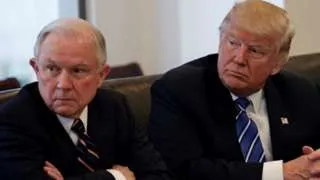Table of Contents
On March 3, Attorney General Sessions fired forty-six Obama-appointed United States Attorneys across the nation. Chaos ensued among liberal outlets shortly after the announcement. The New York Times characterized the firings as yet another “rocky encounter between the Trump administration and the nation’s law enforcement apparatus.” Not to be outdone, Salon accused the Justice Department of purging prosecutors in an effort to avoid potentially scandalous investigations. Of course, if these charges were true, every political pundit would have cause for concern. There is only one problem with this narrative, however. It is much ado about nothing.
We could evaluate the Justice Department firings in several different ways. First, we could compare the Trump administration’s actions to past presidents’ conduct. If we consider historical practice, President Trump is not the first commander-in-chief to oust his predecessor’s subordinates. In March 1993, Janet Reno, Bill Clinton’s Attorney General, immediately fired ninety-three U.S. Attorneys appointed by George H.W. Bush after she took office. Most Obama-appointed U.S. Attorneys understood this customary practice because more than half resigned on their own before Trump took office. While it is true that George W. Bush and Barack Obama abstained from mass and abrupt layoffs, the action is not historically unprecedented.
Furthermore, Mr. Trump certainly had the legal authority to fire Obama’s political appointees. Past Supreme Court decisions confirm that Trump could legally dismiss Obama’s lawyers. In Myers v. United States (1926), the Supreme Court held that the President had the exclusive authority under the Constitution to remove executive officials such as U.S. Attorneys. If this were not so the Court reasoned it would be “impossible for the President…to take care that the laws be faithfully executed.” The power to remove is the power to control.
Finally, if our main concern is efficient and effective government, we should support Trump’s action. The Constitution requires that the president must faithfully execute the laws. But the president is often blamed for the government’s legal positions even though he takes no direct role in formulating them. The best way to solve this accountability problem is to ensure that U.S. Attorneys be directly responsible to the president and can be easily removed if they purposefully or inadvertently undermine his positions. After all, it would be patently unfair to blame Mr. Trump for an agency’s positions if the president had no ability to allocate law enforcement resources, set priorities, or staff the government with associates who share his ideological views. While the president is commonly blamed for problems beyond his control, it is important that voters properly identify who is actually at fault, to increase accountability and solve problems.
The Constitution’s original meaning reaffirms this position. The framers wanted to create an executive branch that could enforce federal laws, remain accountable to the public, and resist encroachments from Congress and the courts. Entrusting the president with responsibility for all executive tasks lets the public blame him if things go awry. And an executive department under firm presidential control gives the commander-in-chief the necessary tools to resist aggressive legislative and judicial action. Trump’s decision to staff the Justice Department with like-minded lawyers allows him to carry out his policy program, ensure that future criticism is legitimate, and prevent the other branches from wrongfully siphoning the president’s power.
Enlightened statesmen will not always be at the helm. Some may have more confidence in our current leadership than others. But without granting or exercising power, effective and efficient government would be impossible. Our founding document’s precise purpose is to constitute a government that can advance the people’s general welfare within predetermined limits. Trump’s actions fit these limits and improve the efficiency of his administration. We do not get to pick and choose whether the government works smoothly based on our opinion of who is in office. These fights are best left where they belong: the polling booth.





